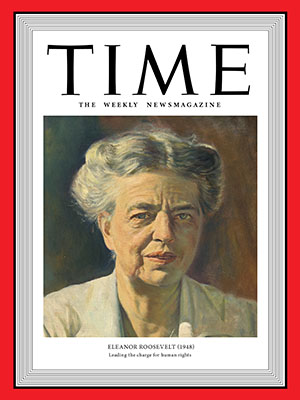If there is one single person most responsible for the United Nations' Universal Declaration of Human Rights (UDHR, 1948), then that person would probably be Eleanor Roosevelt, former first lady of the United States from 1932 to 1945.
Anna Eleanor Roosevelt (1884-1962) married her fifth cousin once removed (I looked it up, "fifth cousins share a pair of Great-Great-Great-Great Grandparents.") Franklin Delano Roosevelt (1882-1945) in 1905. Through her father, she was also a niece of President Theodore Roosevelt (1858-1919). The websites listed below all have great, detailed biographical informational about the former first lady. Let me just make a few comments.
Eleanor was active with human and civil rights issues since the early 1920s when she became an outspoken activist for working women, supporting a minimum wage and limited workweek. She also played a major role in her husband's political campaigns at the time, especially after he contracted polio in 1921. She criss-crossed the state of New York with him, giving speeches and making public appearance.
When Eleanor became first lady in 1933, she was initially hesitant because typically first ladies did nothing more than act as a White House social hostess. But that changed as slowly Mrs. Roosevelt began to use her position to advocate for a variety of issues. Since she was in the public's eye, she used that prominence to some advantage. In the first year of the presidency when the World War I veterans again descended on Washington demanding their bonuses, she went out to meet and speak with them. That was a much different approach than President Hoover's use of the army to disperse the veterans in 1932. Eleanor's actions in this instance clearly presaged her future activist role.
In the 1930s, at different points in time, she took up controversial rights issues connected with youth, women and African-Americans. For example, she invited hundreds of African-American guests to the White House, and in 1939 she intervened on behalf of Marian Anderson when the singer was denied the use of Constitution Hall in Washington, DC by the Daughters of the American Revolution. That concert later took place, in far mote impressive fashion, on the steps of the Lincoln Memorial (Easter Sunday, 9 April 1939) and highlighted civil rights issues in the nation. That made Eleanor Roosevelt' especially unpopular in the South, which was an important constituency for the Democratic party at the time. Before the war, she also lobbied the president (unfortunately, unsuccessfully) to allow greater immigration of Jews fleeing Nazi persecution. And following the attack on Pearl harbor, 7 December 1941, Eleanor again spoke against persecution of minority groups in the United States, like Japanese-Americans, but that did not stop the president from issuing his notorious executive order number 9066 (19 February 1942) that set in motion the incarceration of Japanese-Americans (and to a much lesser extent German-Americans, and Italian-Americans) in concentration camps.
In her life, Eleanor Roosevelt was a path-breaker in the use of public relations. No doubt, she was outspoken!
- She held almost four-hundred press conferences during her husband's presidency, and she traveled widely. During the war she went to England in October 1942, and then in August 1943 she visited American forces scattered throughout the South Pacific. Admiral William "Bull" Halsey was said to have remarked, "she alone accomplished more good than any other person, or any groups of civilians, who had passed through my area."
- She published widely in national magazines like the Woman's Home Companion. She also wrote an almost-daily syndicated newspaper column, "My Day."
- Roosevelt also made extensive use of radio. She had a regular radio program, beginning in 1934.
Perhaps her most important role came after the death of her husband. In December 1945, President Truman appointed Eleanor Roosevelt as a delegate to the new United Nations General Assembly, and the following year, she became the first chair of the ad-hoc United Nations Commission on Human Rights. In that position, she played an instrumental role in the drafting of the Universal Declaration of Human Rights. The UN General Assembly adopted the Declaration on 10 December 1948 unanimously except for the abstentions of the Soviet bloc, South Africa and Saudi Arabia. Later she continued as U.S. representative on the United Nations Commission on Human Rights.
At her death on 1962, Adlai Stevenson, former Democratic candidate for president in 1952 and 1956, said: "What other single human being has touched and transformed the existence of so many?" and adding, "She would rather light a candle than curse the darkness, and her glow has warmed the world." (cite) As a woman, Eleanor Roosevelt did so much to forge a new model of an advocate for civil, political and human rights.
![]()
Some recommended online resources
- Wikipedia
- Whitehouse.gov
- Firstladies.org
- Eleanor Roosevelt (history.com)
- Biography.com
- Eleanor Roosevelt Biography (FDR Presidential Library)
- Debra Michals, Eleanor Roosevelt (National Women's History Museum, 2017)
- Text and Audio of Eleanor Roosevelt's Address to the United Nations General Assembly
- Mrs. Roosevelt Dies at 78 after Illness of Six Weeks (New York Times obituary)
- Eleanor Roosevelt Papers Project
- Eleanor Roosevelt and the Rise of Social Reform in the 1930s
- American Experience: Eleanor (PBS)
- There are so many sites available about Eleanor Roosevelt. For extra credit please suggest to your instructor a very relevant website for these notes. Send the title of the site, the URL and a brief explanation why you find the information interesting and applicable to this material.
